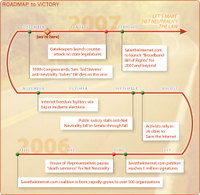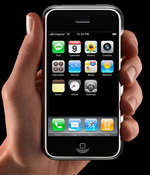
The reason the Bells win is, in a word, persistence.
It’s hard, almost impossible, for ordinary citizens to sustain a lobbying campaign for year-after-year against paid professionals. While last year’s draw on network neutrality felt like a victory to neutrality advocates (especially after AT&T promised to be nice for at least a little while at year-end) the fight will continue until either AT&T is destroyed or the Internet is.
Hate to be so stark about it, but that’s the way it is.
Over the past weekend Freepress.org tried to gird the community’s loins for the new fight. They held a conference in Memphis and hoped for 3,000 attendees.
What seems clearest to me is that the fight has moved from the edges of the network to the core. Consolidation means that AT&T and Verizon, between them, have a virtual stranglehold over the core of the U.S. Internet.
What they plan on doing with this is to separate session information from content information, in the core of the Internet itself.
What does this mean? Right now all bit streams are equal. You send a request for a file to YouTube and that’s a bit stream. The file comes back and that’s a bit stream. What AT&T plans to do, using Cisco equipment, is to separate those bit streams, between the content and the session. This will enable it to discriminate, based on its business relationship with the session provider. Does it have a "special relationship"with the provider, as AT&T does with Yahoo? No. Bandwidth gets choked, somewhere.
This sort of thing is already happening in the cellular area, where net neutrality rules do not apply. The control of content by carriers has remained unquestioned throughout this decade. There is no such thing as "wireless Internet" — there is only your use of the provider’s network to reach what the provider allows you to reach.
So may I humbly suggest that the above "roadmap" from SavetheInternet.Com be scrapped.
Rather than fighting a defensive war against what AT&T plans to do
in the core, I would propose that net neutrality proponents instead
fight an offensive war against what they’re already doing in the
cellular world.
Start with the Cingular (AT&T) exclusive with Apple
on the iPhone. I’m certain Verizon would love for its customers to be
able to use these hot new phones. I don’t even think Apple would object, too strongly. The law should allow it.
No, the law should mandate it. Free exchange of SIM cards, which
control what a cell phone does, should become the law of the land.
Separate the network from the equipment, as is done on the Internet.
Put that in the hopper at Congress and the FBI…then watch the pigs
squeal.
Stop playing defense. Make them worry about what you’re going to do and you’re halfway to victory.











You may find this article interesting.
http://blogs.zdnet.com/Gardner/?p=2399
Dana Gardner
January 12th, 2007
End of the PC? No, iPhone is the end of the cell phone.
snip.
What this tells me is that Jobs and company are forging a bold stroke, and forcing a major confrontation. Ultimately, in the long run, would you as a business user and consumer rather have ubiquitous Internet access and VOIP, or the current piss-poor assemblage of mangled handset (but it’s sleek and pretty!), hopscotch cell networks, analog-to-digital dreck, call drops and poor customer service, bad software, bad billing, and lack of integration to your PC and content?
The fact is that the needed convergence between handset makers, network providers, content aggregators, and software third-parties (including Microsoft, screwing around with Vista) have failed miserably — at least in the U.S. This has left a huge hole open through which Apple will drive the iPhone.
It’s a longshot in the short-term, but if they succeed the cell industry will be soon shrinking rapidly into irrelevancy. All that wasted money! Too bad because all things will be Internet Protocol-based — the best true convergence. The Wi-Fi spots today will burgeon and blossom via new WiMax meshes, and later via satellite-based Internet canopies (for higher “roaming” cost, for sure). Your PC and iPhone (using the same guts and GUIs) will hop along an IP constellation, with certain “visitor” fees applied but no single-provider lock-in.
snip.
BillK
You may find this article interesting.
http://blogs.zdnet.com/Gardner/?p=2399
Dana Gardner
January 12th, 2007
End of the PC? No, iPhone is the end of the cell phone.
snip.
What this tells me is that Jobs and company are forging a bold stroke, and forcing a major confrontation. Ultimately, in the long run, would you as a business user and consumer rather have ubiquitous Internet access and VOIP, or the current piss-poor assemblage of mangled handset (but it’s sleek and pretty!), hopscotch cell networks, analog-to-digital dreck, call drops and poor customer service, bad software, bad billing, and lack of integration to your PC and content?
The fact is that the needed convergence between handset makers, network providers, content aggregators, and software third-parties (including Microsoft, screwing around with Vista) have failed miserably — at least in the U.S. This has left a huge hole open through which Apple will drive the iPhone.
It’s a longshot in the short-term, but if they succeed the cell industry will be soon shrinking rapidly into irrelevancy. All that wasted money! Too bad because all things will be Internet Protocol-based — the best true convergence. The Wi-Fi spots today will burgeon and blossom via new WiMax meshes, and later via satellite-based Internet canopies (for higher “roaming” cost, for sure). Your PC and iPhone (using the same guts and GUIs) will hop along an IP constellation, with certain “visitor” fees applied but no single-provider lock-in.
snip.
BillK
The problem is that CDMA carriers like Sprint and Verizon don’t even support SIM cards. You will never be able to use a device on their network without explicit permission — you need to call them up, give them the device’s hard-coded identifier, and have them associate that identifier with your account before you can use it. If you call up your carrier and ask to have a device associated and they say no, you are shit out of luck unless you want to do some very hardcore hacking into the device. Anyway, in the case of the iPhone, Apple would also have to build a CDMA version . . .
The problem is that CDMA carriers like Sprint and Verizon don’t even support SIM cards. You will never be able to use a device on their network without explicit permission — you need to call them up, give them the device’s hard-coded identifier, and have them associate that identifier with your account before you can use it. If you call up your carrier and ask to have a device associated and they say no, you are shit out of luck unless you want to do some very hardcore hacking into the device. Anyway, in the case of the iPhone, Apple would also have to build a CDMA version . . .